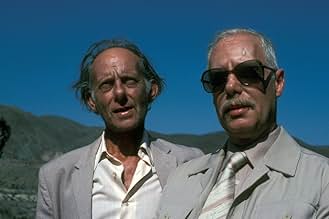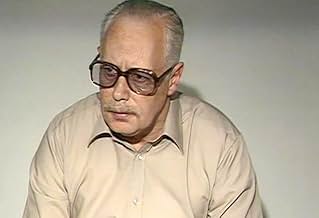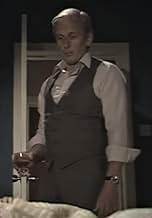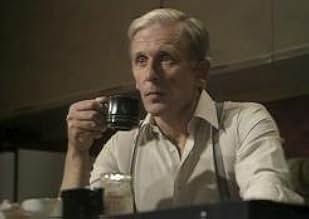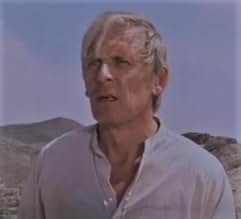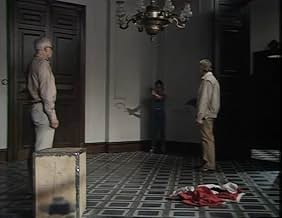Nos anos que se seguiram à Segunda Guerra Mundial, a situação virou: o ambicioso e cruel oficial da Gestapo Ludwig Kessler, o caçador mais implacável de todos os oponentes do Terceiro Reich.Nos anos que se seguiram à Segunda Guerra Mundial, a situação virou: o ambicioso e cruel oficial da Gestapo Ludwig Kessler, o caçador mais implacável de todos os oponentes do Terceiro Reich.Nos anos que se seguiram à Segunda Guerra Mundial, a situação virou: o ambicioso e cruel oficial da Gestapo Ludwig Kessler, o caçador mais implacável de todos os oponentes do Terceiro Reich.
Explorar episódios
Avaliações em destaque
"Kessler" reminded me of a TV adaptation of a Jack Higgins novel. (This might be seen as damning with faint praise.) Three members of "Lifeline" (the Belgian group that helped downed Allied flyers), appear only in the first episode, then the series shows an underwhelming West German security agent and an Israeli girl (played by a future Playboy model) tracking Kessler to South America where he meets other Nazis - the Kameradenwerk. At the inevitable confrontation, there's a prolonged debate about Kessler's philosophy and actions, during which the agent exclaims "words, just words; people are sick and tired of them", which prompted me to agree, so drawn out was the discussion.
With a cast comprising mainly C list actors, it's not difficult for Clifford Rose's performance to stand out. For nearly all the time he wears large-framed spectacles that obscure much of his face, and on the odd occasion when he removes them his face does not appear to have aged as much as the series' timeline might call for, but his movements are convincingly those of an old man. (He himself was then in his very early fifties.) He portrays a wide range of emotions: love for his dead wife (Madeleine) and his daughter, revulsion for the human experiments carried out by some of the Kameradenwerk, nostalgia for the Third Reich and dreams of a Fourth Reich.
With a cast comprising mainly C list actors, it's not difficult for Clifford Rose's performance to stand out. For nearly all the time he wears large-framed spectacles that obscure much of his face, and on the odd occasion when he removes them his face does not appear to have aged as much as the series' timeline might call for, but his movements are convincingly those of an old man. (He himself was then in his very early fifties.) He portrays a wide range of emotions: love for his dead wife (Madeleine) and his daughter, revulsion for the human experiments carried out by some of the Kameradenwerk, nostalgia for the Third Reich and dreams of a Fourth Reich.
As the follow-on from Secret Army, Kessler lacks everything Secret Army had, tension, drama, good storylines and plotting and well-drawn characters. Alan Dobie's role as Richard Bauer is poorly developed and you never manage to find out why exactly he is pursuing Kessler or why. Nitza Saul's role, as the young Israeli chasing Kessler and helping Bauer, lacks any definition at all. Alison Glennie, as Kessler's daughter Ingrid, is little more than a cardboard cutout pretend Nazi. Not one of Gerald Glaister's better efforts
The first episode of the "Kessler" mini series is a re-worked version of the (unbroadcast) final episode of "Secret Army" (1977-79), "What Did You Do In the War Daddy?", which the BBC management had refused to broadcast in 1979.
As such, the first episode features the surviving cast of "Secret Army" - Albert, Monique and Natalie. This is great, but they only appear in the first episode (which sets up this series).
Overall, "Kessler" was disappointing. It didn't have the strong dramatic tensions which had made "Secret Army" such a success. Removed from his Gestapo post, and on the run, Kessler was no longer the sinister menace that had given the character such strength in "Secret Army".
And it was, of course, impossible to present the character sympathetically. This was a serious drawback to the series. The main character must have the audience's sympathy if we are to care what happens to him.
"Secret Army" had very successfully characterised its two Luftwaffe officers - Major Brandt and Major Rienhardt - sympathetically, by their contrast to the evil Kessler. But it was impossible for the writers to do anything with Kessler himself other than demonise the character. This seriously undermined the "Kessler" series, as there was never any chance for the audience to like the lead character.
The presence of the well-loved Resistance heroes of "Secret Army" might yet have saved the day. But that was made impossible by the decision to set the sequel mainly in South America, and to give it a completely new cast (for all but the first episode). Only Kessler himself continued from "Secret Army".
I was particularly surprised by the absence of Madelaine (Hazel McBride), Kessler's only friend in the earlier series, who might have stood at least some chance of showing up a human side to him.
As such, the first episode features the surviving cast of "Secret Army" - Albert, Monique and Natalie. This is great, but they only appear in the first episode (which sets up this series).
Overall, "Kessler" was disappointing. It didn't have the strong dramatic tensions which had made "Secret Army" such a success. Removed from his Gestapo post, and on the run, Kessler was no longer the sinister menace that had given the character such strength in "Secret Army".
And it was, of course, impossible to present the character sympathetically. This was a serious drawback to the series. The main character must have the audience's sympathy if we are to care what happens to him.
"Secret Army" had very successfully characterised its two Luftwaffe officers - Major Brandt and Major Rienhardt - sympathetically, by their contrast to the evil Kessler. But it was impossible for the writers to do anything with Kessler himself other than demonise the character. This seriously undermined the "Kessler" series, as there was never any chance for the audience to like the lead character.
The presence of the well-loved Resistance heroes of "Secret Army" might yet have saved the day. But that was made impossible by the decision to set the sequel mainly in South America, and to give it a completely new cast (for all but the first episode). Only Kessler himself continued from "Secret Army".
I was particularly surprised by the absence of Madelaine (Hazel McBride), Kessler's only friend in the earlier series, who might have stood at least some chance of showing up a human side to him.
Not really a sequel to Secret Army, despite the brief appearances of Monique, Albert and Natalie, all of whom are wasted in the first episode. Hopes are raised that they will have a major part to play but these are soon dashed. Kessler himself seems less menacing if still unsympathetic but suffers from the lack of interplay and rivalry with his Luftwaffe counterparts. His rise in the Nazi hierarchy is unconvincing. He still has a pretty boy assistant now in a three piece suit rather than SS uniform though Franz is nastier, more ambitious and devious than his two predecessors. Kessler's daughter Ingrid does not have the humanising effect of her mother Madeleine but is a caricature of a neo Nazi madchen. The Nazi hunters lack depth and the ageing Nazis are stereotypes. The pace, characterisation, dramatic structure, tension and atmosphere are all inferior to Secret Army. All told a disappointment unworthy of its inspiration, it would have been better if there were no link with Secret Army.
A Belgian journalist sets the wheels in motion, in a bid to hunt down former Nazi officer, Ludwig Kessler, who's now living a successful new life, with a new name.
It's definitely an interesting storyline, a group of fanatics still desperate to see Hitler's plans put into action, a network exposed.
The chances are you'll have come here from The Secret Army, hoping for an extension of that great series, and a continuation of that same quality, unfortunately Kessler doesn't quite hit those levels.
It's a bit of a clunky production, it doesn't move at pace, it doesn't really spark into life until later on in the series, the first trio of episodes are actually slow moving.
Initially you'll wonder if the budget was quite small, but it soon becomes apparent that it was used for the location work, and it's fair to say there is a great variety, it never feels studio bound.
The acting, for me this was the stumbling block, Clifford Rose was pretty good as the titled character, I found his character quite well rounded and sincere, the supporting cast however, some of the acting was flat, with blank characters, I never felt like I understood why Rak and Bauer were so heavily involved.
I've tried a few times to watch it, but always quit after episode two or three, I'm glad I persisted this time, as it does improve towards the end, sadly the first half of the series is just so dull.
6/10.
It's definitely an interesting storyline, a group of fanatics still desperate to see Hitler's plans put into action, a network exposed.
The chances are you'll have come here from The Secret Army, hoping for an extension of that great series, and a continuation of that same quality, unfortunately Kessler doesn't quite hit those levels.
It's a bit of a clunky production, it doesn't move at pace, it doesn't really spark into life until later on in the series, the first trio of episodes are actually slow moving.
Initially you'll wonder if the budget was quite small, but it soon becomes apparent that it was used for the location work, and it's fair to say there is a great variety, it never feels studio bound.
The acting, for me this was the stumbling block, Clifford Rose was pretty good as the titled character, I found his character quite well rounded and sincere, the supporting cast however, some of the acting was flat, with blank characters, I never felt like I understood why Rak and Bauer were so heavily involved.
I've tried a few times to watch it, but always quit after episode two or three, I'm glad I persisted this time, as it does improve towards the end, sadly the first half of the series is just so dull.
6/10.
Você sabia?
- CuriosidadesThe serial incorporates several elements of What Did You Do in the War, Daddy? (1979), the never aired final episode of Secret Army (1977) which was also written by John Brason: Kessler married his Belgian mistress Madeleine Duclos, who has since died, and has established himself as a major industrialist in West Germany under the pseudonym Manfred Dorf, Monique has a son in his twenties and returns to Brussels for the first time since the end of the war, Albert still owns the Candide in addition to six other restaurants and the surviving members of Lifeline reunite for the purposes of a documentary series entitled "In Our Time" which attempts to expose Kessler as a Nazi war criminal.
- Cenas durante ou pós-créditosThe opening titles start by displaying the letters SS which change to the name Kessler.
- ConexõesFollows Secret Army (1977)
Principais escolhas
Faça login para avaliar e ver a lista de recomendações personalizadas
- How many seasons does Kessler have?Fornecido pela Alexa
Detalhes
Contribua para esta página
Sugerir uma alteração ou adicionar conteúdo ausente


